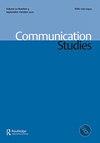The Moderating Effects of Emotional Intelligence on Clinical Communication Self-Efficacy and Caregiver Burden
IF 1.3
Q2 COMMUNICATION
引用次数: 0
Abstract
ABSTRACT This study addresses the gap in research on family caregivers by examining how specific communication skills may affect caregiver burden. Caregiver burden is the perception of whether caregiving has a negative effect on an individual’s functioning, including physical, social, and emotional operation. This paper examines the impact of two types of self-perceptions that are related to communication competence. Self-efficacy refers to one’s confidence in being able to communicate with clinicians. Emotional intelligence is a subset of social intelligence and represents one’s ability to manage their own and others’ feelings and emotions. Three hundred and two participants self-identified as caregivers completed a survey that included measures of caregiver burden, clinical communication self-efficacy, and trait emotional intelligence. Hierarchical regression analysis revealed that both higher levels of clinical communication self-efficacy and emotional intelligence decreased caregiver burden. However, emotional intelligence moderated the relationship between clinical communication self-efficacy and caregiver burden in that higher clinical communication self-efficacy was more strongly related to less burden when respondents also reported higher emotional intelligence. Theoretical and practical implications are discussed.情绪智力对临床沟通自我效能感和护理人员负担的调节作用
摘要本研究通过研究特定的沟通技能如何影响照顾者的负担,填补了对家庭照顾者研究的空白。照顾者负担是指对照顾是否对个人功能产生负面影响的看法,包括身体、社会和情感操作。本文考察了与沟通能力相关的两种类型的自我认知的影响。自我效能感是指一个人对能够与临床医生沟通的信心。情商是社会智力的一个子集,代表一个人管理自己和他人感受和情绪的能力。322名自我认定为照顾者的参与者完成了一项调查,其中包括照顾者负担、临床沟通自我效能感和特质情商的测量。分层回归分析显示,较高水平的临床沟通自我效能感和情商都降低了照顾者的负担。然而,情绪智力调节了临床沟通自我效能感和照顾者负担之间的关系,因为当受访者也报告了较高的情绪智力时,较高的临床交流自我效能感与较低的负担更密切相关。讨论了理论和实践意义。
本文章由计算机程序翻译,如有差异,请以英文原文为准。
求助全文
约1分钟内获得全文
求助全文

 求助内容:
求助内容: 应助结果提醒方式:
应助结果提醒方式:


